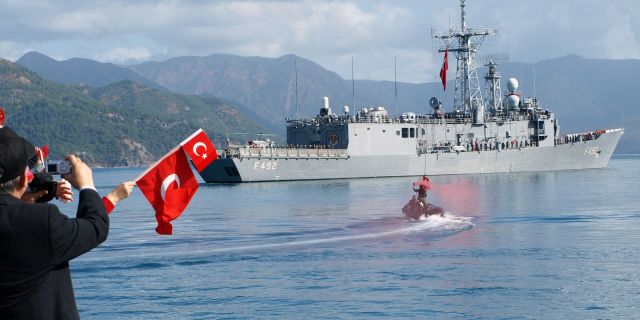The drums of war are beating in the Aegean Sea
With the financial help of Washington, Greece has placed several military bases on the demilitarized islands in the Aegean Sea, writes Haggin. These steps lead to a new round of geopolitical struggle in the region.
Dmitry Roy
"We call on Greece to stop the militarization of the islands, which have a non-military status, and act in accordance with international agreements. I'm not joking, I'm serious," Recep Erdogan said at the EFES-2022 exercises. Ankara's fears are caused by distrust of both Greece and the United States, which are strengthening their military presence on the islands located near the territory of Turkey.
The Eastern Mediterranean, of which the Aegean Sea is a part, is becoming too crowded and a geopolitically saturated point of the globe. Here are the fleets of Turkey, Greece, France, Italy and Egypt. And smuggling flows – weapons, mercenaries, refugees – from the Middle East and North Africa to southern Europe and the Balkans. And trade routes from the Black Sea to the Mediterranean and vice versa. And the military and political interests of external players around Libya and Syria.
And there is also the status of Cyprus, the energy projects of Ankara, Cairo and Tel Aviv. And plus to everything – a new round of geopolitical struggle in the Balkans. And the United States is reducing its presence here – therefore, it is urgently necessary to create a new balance of interests.
In accordance with the Treaty of Lausanne of 1923, as well as the Treaty of Paris of 1947, on Lemnos, Samothrace and the islands of the eastern Aegean (Lesbos, Chios, Samos, Nikaria) and Dodecanese (Stompaglia (Astypalea/Stampalia), Rhodes, Halki, Scarpanto, Kasos, Piskopis, Nisyros) Kalymnos, Leros, Patmos, Lipsos, Simi, Kos and the island of Mays should not host any armed forces. Except the cops.
In reality, the Greeks have now placed 3 air bases, 8 naval bases, 5 radar complexes, 70 general-purpose military bases and 86 military posts on these "demilitarized" islands. Moreover, they did it all with the financial help of Washington, which in such cases is always happy to help Athens more than Ankara.
It is quite natural that Turkey is extremely concerned about this, which quite reasonably asks the question: "Who are you arming yourself against?" And does not receive a clear answer to it. The issue has already been brought to the UN level, where Ankara has already sent two letters asking to sort out the situation.
The drums of war sound, it would seem, louder, but high-ranking Turkish sources reported haqqin.az that "Turkey will not pursue an aggressive policy. We want to conduct diplomacy. Turkey does not intend to land troops on the islands, because there is no such threat."
Other Turkish sources haqqin.az declare the following: "It would be madness for Greece to attack Turkey from the territory of the armed islands, we do not expect them to take such a step. Since they are unlikely to attack Turkey, in other words, since we do not perceive such a threat, we do not plan to take a military step."
Meanwhile, the Greek media have already named as many as five dates for the start of a possible Turkish military operation "to demilitarize the islands." Here and on July 20, the anniversary of the 1st stage of the peacekeeping operation in Cyprus – Atilla Harekâtı, here and on July 24 – the anniversary of the signing of the Treaty of Lausanne. And on August 6 – the anniversary of the signing of the Greek-Egyptian agreement on the exclusive economic zone, and on August 14 – the anniversary of the second stage of the Cyprus operation. And, of course, on August 30, the day of Turkey's victory over Greece in 1922.
But no matter how much Greek journalists strain themselves, no matter how much they knock on the drums of war, the probability of an armed conflict is extremely low. Neither Ankara nor Athens is seriously considering such a possibility. Which, by the way, is well understood both in Europe and in NATO, where the maximum reaction is the appeals of the parties to everything good.

